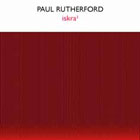Home » Jazz Articles » Multiple Reviews » Paul Rutherford: Neuph & Iskra3
Paul Rutherford: Neuph & Iskra3
 Paul Rutherford
Paul Rutherford
Neuph (1978-80)
Emanem
2005
Neuph, recorded in its original LP form in January 1978 and now augmented with the live tracks from 1980, made use of an old recording standard—overdubbing—but in a such a way as to create a discussion about the role of a solo improviser. Rutherford plays various extemporaneous tunes on as few as one euphonium or as much as four overlayed trombones. The musicianship and experimentation is excellent but what is confounding is that Rutherford is reacting to himself, not in real time, but in a studio, even speeding up certain tracks, to create a soundscape far different than the two live solo trombone tracks that open and close the disc. Some might call it impersonal, but it offers fascinating answers to the questions of how to play solo and how to use available technology to expand the role of a musician.
 Paul Rutherford
Paul Rutherford
Iskra3
Psi
2005
Iskra3 is a different beast as Rutherford has a more traditional function than on Neuph but utilizes a modern innovation—computer processing—to update what an acoustic instrument, albeit one played in expert hands, can accomplish when its musical counterpart is a machine, though one manipulated by its own duo of improvisors (Robert Jarvis and Lawrence Casserly). Both discs are less about music and more about aural exploration, a dichotomy that Rutherford has embraced his whole career.
Track and Personnel Listings
Neuph (1978-80)
Tracks: Roman Tick for one trombone; Yep 321 for two euphoniums; Realign 4 for four trombones; Three Levels for three trombones (one double speed); Paunch and Judies for one double speed trombone and dog; Chefor for one euphonium; Phase 2/2 for two trombones and two euphoniums; Neuph for one trombone and one euphonium; Pisa Ear for one trombone.
Personnel: Paul Rutherford: trombone, euphonium.
Iskra3
Tracks: Zenquahn; Ommbuhl; Bodrivar; Falgoric; Brelfor; Felcrum; Mayilcra.
Personnel: Paul Rutherford: trombone; Robert Jarvis, Lawrence Casserley: live computer processing.
Tags
PREVIOUS / NEXT
Support All About Jazz
 All About Jazz has been a pillar of jazz since 1995, championing it as an art form and, more importantly, supporting the musicians who make it. Our enduring commitment has made "AAJ" one of the most culturally important websites of its kind, read by hundreds of thousands of fans, musicians and industry figures every month.
All About Jazz has been a pillar of jazz since 1995, championing it as an art form and, more importantly, supporting the musicians who make it. Our enduring commitment has made "AAJ" one of the most culturally important websites of its kind, read by hundreds of thousands of fans, musicians and industry figures every month.






















